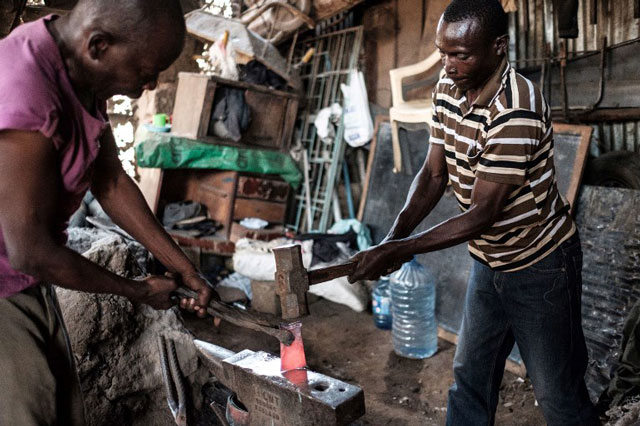
Nairobi, Kenya | AFP | “Time for an interview? I have a lot of time at the moment,” said Owino Onyango, sweating as he stepped out of his blacksmith’s shop in Nairobi to talk business, and politics.
“Business goes with politics: if politics go down, business also goes down”, said the 64-year-old, grumbling about the “unhealthy” political climate in Kenya since the Supreme Court’s September annulment of President Uhuru Kenyatta’s election.
Election seasons stifle the economy in Kenya, but this year’s protracted crisis, with many weeks of court disputes and street protests, has been particularly bad for business.
Onyango appears hard at work, hammering a glowing shaft of metal fresh from the forge, but his industry is an illusion. “There aren’t many orders so I’m repairing some of my tools,” he said. In recent weeks Onyango has been forced to fire two of his five employees.
“Political leaders must negotiate among themselves to settle this,” he said. While well-off political elites talk, the “mwananchi” — meaning ordinary folk in Swahili — suffer the most, he said, especially in Kibera, where even in stable times many have to get by on less than a dollar a day.
Onyango’s own weekly turnover has fallen from around 30,000 shillings ($290, 250 euros) before the elections to 10,000 now, he said.
– Growth shrinks –
Across Kenya’s private sector, from small shops to big investors, elections are bad news.
“The private sector, mainly the manufacturers, adopt a bit of a wait and see approach,” said Jibran Qureishi, chief economist for East Africa at Stanbic Bank.
“They stand back, they don’t hire, they don’t build up inventories,” he said. Fear of violence, Qureishi said, is the big issue, since almost every election in the past quarter century has been preceded or followed by killings and protest.
The Kenya National Commission on Human Right documented 37 deaths, all but two at the hands of police, in the days following the August 8 election.
Kenya looked set to return to normal despite anger over President Uhuru Kenyatta’s re-election, but the Supreme Court’s annulment of the result has left the country facing months of uncertainty, and an increasingly tense political climate.
 The Independent Uganda: You get the Truth we Pay the Price
The Independent Uganda: You get the Truth we Pay the Price



